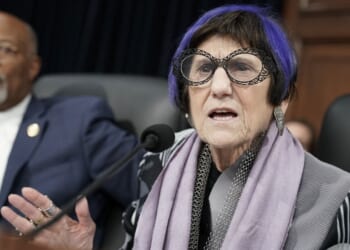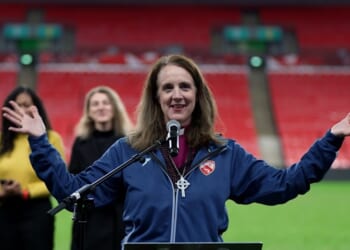On the local front I have sought to draw attention to the case of JayCee Cooper v. USA Powerlifting in several posts over the past two years. The case raised the question whether USAPL’s separation of men from women in USAPL’s Minnesota competitions violates the Minnesota Human Rights Act and must yield to Cooper’s self-identification as a woman. The case gestated for nearly a year at the Minnesota Supreme Court only to be delivered yesterday as Rosemary’s baby (the link is to the Court’s opinion).
It is bad. The Court has held that USAPL unlawfully discriminated against Cooper as a matter of law and left only damages to be decided by the trier of fact (footnote omitted):
[B]ecause USA Powerlifting does not identify any statutory defense or exemption applicable to Cooper’s claim for sexual orientation discrimination in public accommodations, we reinstate the district court’s grant of Cooper’s motion for partial summary judgment as to liability on her claim of public accommodation discrimination because of sexual orientation.
“Place of public accommodation” is a defined term. The MHRA defines it as follows:
“Place of public accommodation” means a business, accommodation, refreshment, entertainment, recreation, or transportation facility of any kind, whether licensed or not, whose goods, services, facilities, privileges, advantages or accommodations are extended, offered, sold, or otherwise made available to the public.
When the case returns to Ramsey County District Court, USAPL is sunk on liability with respect to Cooper’s public accommodation claim. Cooper has only to tell his sad story to make out a claim for damages.
However, the Court left open a “legitimate business purpose” defense on Cooper’s claim of business discrimination:
We conclude that USA Powerlifting has raised genuine issues of material fact precluding summary judgment for Cooper as to the legitimate business purpose defense, based on USA Powerlifting’s claim that fair competition opportunities for similarly situated athletes is a legitimate business reason, that its interpretation of fair play is based on unique considerations of powerlifting, and that it has submitted expert reports and scientific evidence in the record to support its claim that transgender women powerlifters enjoy “increased body and muscle mass, bone density, bone structure, and connective tissues.” Accordingly, we affirm the court of appeals’ reversal of the district court’s grant of partial summary judgment for Cooper as to her claims of discrimination in business.
In summary:
[A]s all parties agree, the MHRA protects persons of transgender status against discrimination. At the time relevant to this lawsuit, this protection was afforded by the MHRA’s prohibitions on discrimination on the basis of sexual orientation. And it is undisputed that the appellant, JayCee Cooper, falls within this protected class. Thus, under the MHRA’s prohibitions on discrimination, USA Powerlifting was not permitted to deny Cooper the full and equal enjoyment of its place of public accommodation because of her transgender status nor engage in business discrimination as to Cooper because of her transgender status, subject to any statutory defense or exemption to liability for such conduct.
It should be noted that Cooper need not pursue his business discrimination claim. He can abandon it and simply proceed on the public accommodation claim. The Court has held USAPL to be liable as a matter of law.
* * * * *
Although a biological male, Cooper seeks to compete with the ladies. He wants to win! Cooper alleged that USAPL’s refusal to yield to his self-identification as a woman violates the Minnesota Human Rights Act and Judge Diamond agreed.
Physical strength lies at the core of weightlifting. Men are stronger than women. Treating men as women destroys the competition. It is absurd.
As we have seen around the country and around the world, the separation of men and women into separate categories is fundamental to fair athletic competition. Reality asserts its claim.
Ramsey County District Judge Patrick Diamond agreed with Cooper. Judge Diamond — he died this past February at the age of 64 — was no gem. He held that USA Powerlifting mistreated Cooper under the terms of the Minnesota Human Rights Act. All that remained to be determined were damages. He granted injunctive relief of his own accord.
USA Powerlifting filed an interlocutory appeal of Judge Diamond’s injunction and determination of liability under the MHRA. The Minnesota Court of Appeals reversed Judge Diamond, holding that “there are genuine issues of material fact with respect to Cooper’s claims of discrimination based on sexual orientation (which is defined by statute to include transgender status)” and “that there are genuine issues of material fact with respect to USAPL’s statutory legitimate-business-purpose defense to Cooper’s claims of discrimination in business.”
This was a 2-1 decision. Judge Jennifer Frisch concurred in part and dissented in part from the panel decision by Judge Matthew Johnson. Judge Frisch agreed with Cooper on the merits of his claims. The panel opinions are posted here.
The Minnesota Supreme Court exercised its discretion to review the case. Holding oral argument this past December, the Court exhibited symptoms of legal dysphoria. The six members of the court who heard the argument were all appointees of Governors Walz and Dayton. (The recently appointed Justice Theodora Gaïtas recused herself from the case.) The political dimension has exacted a dumbing down of the court.
Ansis Viksnins represents USA Powerlifting. He is an old acquaintance who has patiently answered my questions about this unreal case along the way. This is the heart of the statement he gave me on the Court of Appeals decision. Readers can insert their own [sic] after Ansis’s references to Cooper as “her”:
USA Powerlifting did not exclude JayCee Cooper from the women’s category because of her gender identity. USA Powerlifting excluded her from competing in the women’s division because of her physiology: she was born biologically male and USAPL does not allow athletes who went through male puberty to compete in the women’s division.
Maintaining separate categories based on sex, age, and weight is necessary so that similarly situated athletes are competing in appropriate categories and have fair opportunities of success. Scientific studies show that athletes who have gone through male puberty enjoy a large strength advantage over athletes who go through puberty as a female. The scientific studies also show that suppressing testosterone only reduces the strength advantage by a very minimal amount. Because powerlifting is a strength sport, the strength differences between competitors who were born male and those who were born female are significant.
I thought the dumbing down of the Minnesota Supreme Court was patent in the oral argument before the Minnesota Supreme Court (video here). Ansis swam against the tide in making his argument that the evidence supports USAPL’s nondiscriminatory motive: “The motive here was to separate biological males into a category where they are competing against other people who were born biologically male…[USAPL] separates competitors three ways: by age, weight, and sex. They do not care about gender identity. They do not care about sexual orientation.”
Justice Sarah Hennesy posed the question that stumped Ketanji Brown Jackson. Like Justice Jackson, Justice Hennesy found it to be a real brain twister: “Counsel, what is male physiology?” Unlike Justice Jackson, Ansis had no difficulty resolving that brain twister.
Justice Paul Thissen is a former legislator. He is not stupid. He may be the best lawyer on the all-Democrat court. With his political background, however, he wanted to explore a compromise. Why not implement “an individualized approach” to the application of sex-based differences? Justice Thissen is apparently dissatisfied with the differentiation among sports and leagues by sex.
Gee, how would that work? Can you flesh that out for us, so to speak?
At oral argument Chief Justice Natalie Hudson — the author of the Court’s opinion — followed up, observing that the space between “transgender man” and “born biologically male” is “very thin” (holding her fingers narrowly apart). The “space” is roughly the space between men and women. It is difficult to believe, but the oral argument descended further.
Chief Justice Hudson and her colleagues have now closed her fingers. USAPL has been crushed in that “very thin” space.
Yesterday Ansis made the following points in his media statements on the Court’s decision:
From our perspective, this was a mixed ruling. We prevailed on the issue of being able to present a claim of business discrimination to a jury. On the remaining claims, this Minnesota Supreme Court opinion positions state law contrary to emerging federal law and public opinion on the issue of preserving fair sporting opportunities for women.
We will prepare for [defending] the business discrimination claim as soon as it is calendared.
Our core messaging focuses on four central themes:
• The scientific evidence of male strength advantage in powerlifting (up to 64 percent) remains unrebutted. Science, reason, and common sense are all on our side.
• The importance of fairness and sex-based categories in sport remains unchanged. Athletes should be competing against similarly situated individuals so they all have some reasonable chance of success.
• Our inclusive MX division, created specifically for transgender and nonbinary athletes, shows that we do not have animus toward transgender athletes. As a membership organization that relies on dues and competition fees, we want to include as many people as possible, but are committed to principles of fair competition.
• The widespread support for our position, including public opinion and amici participation by elite athletes. Close to 80 percent of Americans think that transgender women should not be competing against other women. Elite level athletes who understand the realities of competition likewise support USAPL.
As I say above, Cooper need not pursue his business discrimination claim. He can pursue his public accommodation claim by itself and preclude USAPL from asserting any legal defense, leaving only the amount of his damages to be determined.
I asked Ansis for a critique of the Supreme Court decision. He responded to my request (emphasis in original):
The Supreme Court opinion ignores over 50 years of MHRA case law that motive is the ultimate question in a discrimination case and motive is a question for a jury. The Court states that USAPL’s policy is facially discriminatory but never asks the real underlying question: why was the policy adopted? If the Court had asked this question, the public accommodations claim would have been remanded for trial because there is, at a minimum, a jury question of whether USAPL’s motive as discriminatory or legitimate.
Also, the Supreme Court opinion is on a collision course with trends in federal law. The current administration and U.S. Justice Department have clearly taken the position that transgender women and girls should not compete in women’s sports and have threatened Minnesota with negative consequences (including the loss of federal funding) if Minnesota does not change its participation policy.
The Minnesota Supreme Court has often stated that it tries to harmonize Minnesota law with federal law so that people are not left with competing and contradictory statutory demands. But consider this scenario based on [the Court]’s ruling: According to federal law, a transgender girl in high school may not participate in weight lifting or other sports, but, if on weekends, this student wants to compete in USAPL competitions, she is allowed to do so and the sponsoring organization can be civilly liable if it refuses to let her participate. Makes no sense whatsoever.
As I will continue to observe in commenting on this case, the Star Tribune published Minnesota Lynx president Cheryl Reeve’s op-ed column celebrating Judge Diamond’s ruling even before the Star Tribune got around to reporting it. Reeve omitted any discussion of the possible participation of “trans women” athletes in the WNBA. It wouldn’t take many JayCee Coopers to render the WNBA a farce. I wonder if Reeve has the common sense to bewail the injustice (injustice by her lights, that is) of the Court’s decision insofar as it leaves room for a “legitimate business purpose” to exclude them from the game.















